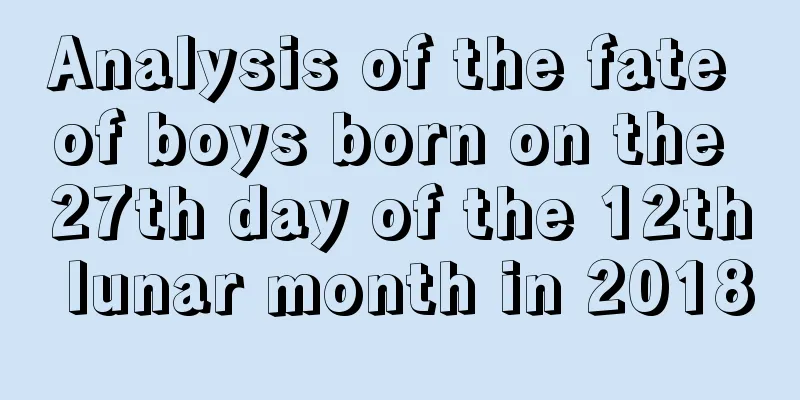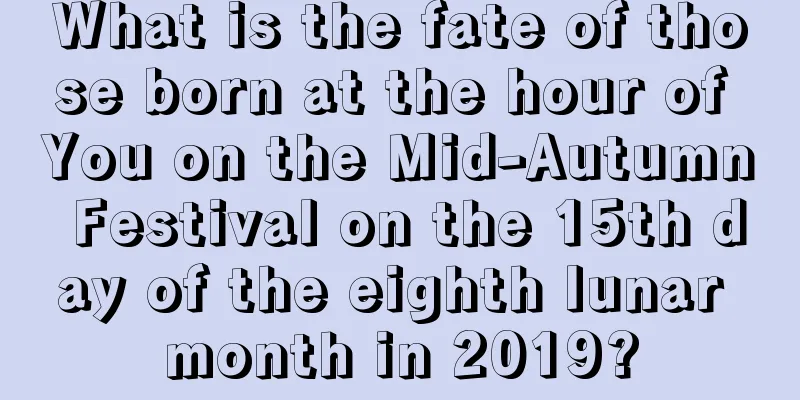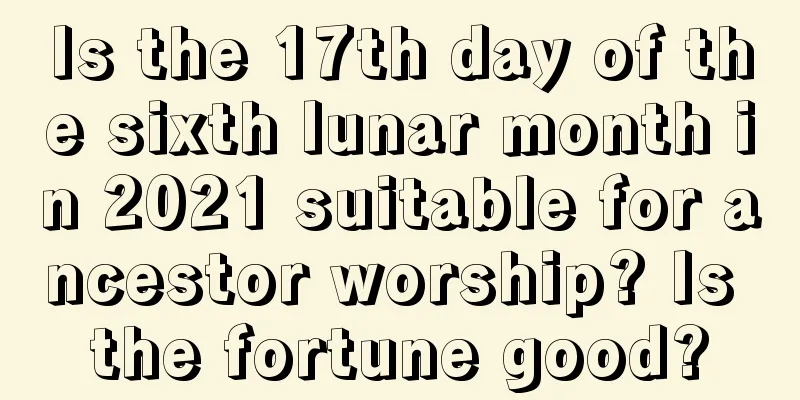Interpretation of seven ancient celebrity Feng Shui stories

|
Introduction: There are many stories about Feng Shui circulating among the people in our country. Some stories are about ghosts; some stories are about emperors and generals; some stories are about beautiful love; and some stories are about myths... Folk stories are very exciting and magical. The editor has compiled some Feng Shui stories for everyone. Friends who are interested, please follow the editor to learn about them! Let’s take a look at this Feng Shui story that is popular among the people. Hong Mai, a man from the Song Dynasty, told such a story in "Yi Zhijian": There were more than 100 households in Ye Zi'ang's family in Xianyou County, all living in a village. The village was surrounded by mountains like a screen. Shaoxing Feng Shui master Luo Zhengfu asserted that this village would produce a prime minister, and this statement later came true for Ye Zi'ang. Zhu Yuanzhang of the Ming Dynasty established Nanjing as the capital and spent a lot of effort on the feng shui of the capital. All the mountains outside Jinling City face the city, except Niu Shou Mountain and Huashan Mountain outside Taiping Gate, which have their backs to the city walls and have no intention of guarding the city. Zhu Yuanzhang was unhappy about this. Legend has it that he once ordered the Ministry of Justice to bring instruments of torture to beat Niu Shou Mountain 100 times, and then to chisel several holes in the stone at the place that looked like a bull's head, and to lock them with iron chains so that the hole faced inwards. He also allowed people to gather firewood in the Flower Mountain, preventing the green hills from growing green. In the Ming Dynasty, there was a county magistrate in Jinxi County named Liu Yongyin. He took a fancy to the feng shui of the ruins of Chao's Jiujingtang in the county. Before his death, he asked his son to buy it so that he would be buried there. Later, the county magistrate's descendant became a Jinshi. Yuan Shikai was once excluded by the Qing court and dismissed from his post and returned to the countryside. He suspected that his family's ancestral tomb was in a state of disrepair, so he asked famous Feng Shui masters to look at the tomb. They all said that it was a real dragon's lair, facing the water, and there were no flaws to be found. A Feng Shui master named Foyin, after receiving Yuan Shikai's letter, also went to see the tomb. He thought that the tomb had a good reputation, a broad name, and all kinds of precious objects were displayed, which was indeed a very precious place. Simply building walls in front, behind, left and right of the cave will restrain the dragon's body, block its qi and meridians, and prevent it from flourishing, but instead it will suffer setbacks. Yuan Shikai thought Foyin's words made sense, so he ordered the craftsmen to demolish the wall. Three years later, Yuan Shikai came out of retirement and became the head of the Republic of China. In the late Qing Dynasty and early Republic of China, there was a saying circulating in Beijing: the decline of Beijing's three dynasties was related to the names of the first three gates of the inner city. The names of the first three gates are: Zhengyangmen, Chongwenmen and Xuanwumen. Zhengyangmen predicted the "Zhizheng" reign at the end of the Yuan Dynasty; Chongwenmen predicted the "Chongzhen" reign at the end of the Ming Dynasty; and Xuanwumen predicted the "Xuantong" reign at the end of the Qing Dynasty. People at that time believed that the demise of the Yuan, Ming and Qing dynasties was caused by the names of the first three gates. Note: After reading too many Feng Shui stories, I found that Feng Shui was exclusively enjoyed by kings, princes, generals and ministers in ancient times. Whoever had great Feng Shui would conquer the world. Those who studied Feng Shui were beyond the reach of ordinary people. For example: King Wen of Zhou, Jiang Ziya, Guiguzi, Lai Buyi, Liu Ji, Zhuge Liang and others were all outstanding people. People were divided into different classes: one is an official, two is a clerk, three is a technique, four is a Taoist, five is a doctor, six is a worker, seven is a craftsman, eight is a prostitute, nine is a Confucian scholar and ten is a beggar. Feng Shui masters ranked third, which shows the status of Feng Shui in people's hearts. Feng Shui has always been used by dignitaries... But now, the great 5,000-year-old civilization is called superstition. You can not believe in Feng Shui, but you can not deny the treasures left by our ancestors... There is a Longquan Mountain in Wuchang County, Hubei Province. It stretches for dozens of kilometers from west to east and reaches the shore of Liangzi Lake. This mountain has the unrestrained Tianma Peak, the Yuping Peak that appeared out of nowhere, the Bijia Peak with mountains standing in line, the Baogai Peak that is as big as a canopy and the Longzhang Peak that towers into the clouds. All the dignitaries in history wanted to occupy this precious land. Zhu Zhen, the sixth son of Zhu Yuanzhang in the Ming Dynasty, was named King Zhao of Chu. He often went to Longquan Mountain to escape the summer heat. He took a fancy to this precious land and sent a Feng Shui master to survey it. Soon, the Feng Shui master really chose a piece of land with "Five Dragons Holding the Saint". However, this land was given to Wuzhi Hou Fan Kuai by Emperor Gaozu Liu Bang as early as the Han Dynasty. Fan was buried at the foot of Tianma Peak. In addition, King Jiangxia Li Daozon, Prime Minister Li Shixi, and Prime Minister Shen Ruyun of the Tang Dynasty were all crowded here. What should I do? If he tried to occupy it by force, he was afraid of being cursed by future generations; but he was unwilling to give up just like that. So, a Feng Shui master named Wang Hualong came up with a trick. A few months in advance, he secretly buried a stone tablet in front of Fan Kuai's tomb, on which was engraved "This place was originally the land of King Zhao, temporarily loaned to Fan Kuai for more than a thousand years. Today the period has expired, and Fan Kuai has moved to the east." Later, Wang Hualong chose an auspicious day, pretended to be a god, and held a ceremony at the foot of the mountain. In front of hundreds of people, he deduced that there was a stone tablet somewhere, with this and that written on it. Just when everyone was skeptical, the stone tablet was really dug out. Everyone was shocked and thought it was God's will. No one could say anything. Fan Kuai's descendants had no choice but to move Fan's tomb several hundred steps to the east. After Zhu Zhen's death, he was buried in the place where Fan Kuai was buried, and a cemetery facing north and south was built for him. After that, many tombs of kings, princes and princesses were crowded into this Feng Shui treasure land. “The Great Wall is still there, but it is hard to see Qin Shihuang in the past.” It is a pity that no matter how good the Feng Shui treasure land was, the Ming Dynasty only existed for more than 270 years. In the end, Zhu Youjian, the last emperor of the Ming Dynasty, ended up hanging himself in the hills behind the imperial palace. |
<<: What Feng Shui issues should a bride pay attention to when getting married?
>>: What Feng Shui considerations should be taken into account when raising turtles?
Recommend
What are the do’s and don’ts on the second day of the second lunar month in 2019?
Spring is a great time full of vitality, with eve...
What are the do's and don'ts on March 23rd of the lunar calendar in 2018?
The Fortune Teller website has carefully compiled...
How is the Mid-Autumn Festival on August 15th of the lunar calendar in 2017? Is it okay to travel far away?
Introduction: In 2017, the Mid-Autumn Festival and...
Is it okay to get engaged on Grain Rain Day in 2020, the Year of the Rat? Is the sign of Grain Rain a good one?
Is it okay to get engaged on Grain Rain Day in 202...
Is it taboo to start construction on the 26th day of the first lunar month in 2020? What is the career hexagram for the rainy day on February 19th?
Introduction: You also need to choose an auspiciou...
Is it a good time to move on the 12th day of the sixth lunar month in 2020? Is this a good day to move into a new house?
The sixth month in the lunar calendar is the firs...
Is the Civil Affairs Bureau open on New Year's Day? Can I apply for a marriage certificate?
Introduction: In our country’s traditional culture...
Query the auspicious and unlucky time of August 23, 2017, and the auspicious and unlucky time of August 23, 2017
August always brings people the sweet scent of os...
Lunar calendar May 25, 2019, is it a good day?
Chinese people believe that the fifth month of th...
Can the contract be signed on the 19th day of the sixth lunar month in 2018? Where is the God of Wealth on that day?
When signing a contract, no matter what kind of co...
Is the fifth day of the ninth lunar month in 2018 suitable for funerals?
Is the fifth day of the ninth lunar month in 2018 ...
Is the 27th day of the sixth lunar month in 2018 a suitable day for signing a contract? When is the auspicious time on that day?
Because signing a contract is a good start for a b...
Is it a good time to repair the grave on the 12th day of the fifth lunar month in 2020? Analysis of the good and bad times on July 2nd!
Introduction: It is necessary to choose an auspici...
Is it okay to decorate for the Ghost Festival on the 15th day of the seventh lunar month in 2019? How many days does the Ghost Festival last?
Introduction: The lunar calendar date of the Ghost...
Auspicious names based on the five elements for children born on National Day in 2020
The National Day and Mid-Autumn Festival in 2020 f...









